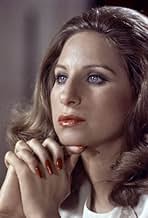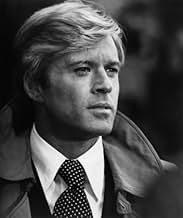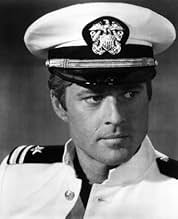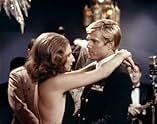NOTE IMDb
7,0/10
29 k
MA NOTE
Deux personnes désespérées vivent une merveilleuse histoire d'amour, mais leurs opinions politiques et leurs convictions les séparent.Deux personnes désespérées vivent une merveilleuse histoire d'amour, mais leurs opinions politiques et leurs convictions les séparent.Deux personnes désespérées vivent une merveilleuse histoire d'amour, mais leurs opinions politiques et leurs convictions les séparent.
- Réalisation
- Scénario
- Casting principal
- Récompensé par 2 Oscars
- 6 victoires et 8 nominations au total
Avis à la une
The theme of a golden boy falling for a girl from "another world", be it social class, the "wrong side of the tracks" or fill in your cliché here, is one that goes back to the silent film era. One of the most famous examples is Sydney Pollack's 1973 film "The Way We Were". Set from the 1930's through the 1950's, Barbra Streisand plays Katie, an outspoken member of the Communist party and campus activist who does not have anything handed to her; she works two and sometimes three jobs in order to pay for her living and college tuition. Hubble (Redford) is your typical aforementioned golden boy, a "big man on campus" who indulges in sports, debutantes and all-around good times. The two know each other from the diner Katie works at (he being the patron) and at one point before graduation, briefly bond over their shared passion for writing. Cut to a few years in the future and Katie encounters Hubble at a bar. Hubble is in the armed forces and Katie is characteristically working a couple of jobs while volunteering for various social causes. After a night of drunken sex (Hubble being the drunken one) they embark on an unlikely relationship that spans over a decade and includes a move to California (when Hubble becomes a screenwriter in Hollywood) and the conception of one child. They are happy, but realize that regardless of their desire, they can't completely cross social lines and certainly can't change one another, particularly Katie's ever-ferocious dedication to social causes; a fight that becomes exponentially heated during McCarthy's Red Scare. The two have to decide whether they can sustain enough raw emotion for one another to persevere over everything else that is stacked up against them.
There are several things about "The Way We Were" that require suspension of disbelief (the fact that despite never having had much contact with one another that after one night of drunken lust and an awkward "morning after" being enough to kick start a relationship the magnitude of theirs is the first thing that comes to mind) but the bottom line is that it really is a well-written, well-directed and well-acted film. The two principal characters are full and complex, regardless of whether we are talking about the socially conscience Katie or the socially acceptable Hubble. I suspect they somewhat were written with the intent of familiarity for the purpose of effectiveness, and if this is true, it worked on me. The era in which these two characters were set was a very interesting time in American history, and the characters' actions during these times created some compelling cinema, particularly when it touched on the Red Scare.
But who am I fooling? The main reason people watch this movie, whether for the first time or for the fiftieth is for the doomed romance, and Streisand and Redford deliver in spades. "The Way We Were" was written for Streisand, (something that cause Redford to turn down the part at first, because he knew the film was going to be hers) and her portrayal of Katie is excellent. There are so many perceptions of Streisand nowadays (some of them correct, to be sure) that it's easy to forget that she really does have some serious acting chops, and she exhibits them to full effect here. I also happened to learn that the soft filtered lens thing with her didn't just start with her later movies, for whatever reason she was filmed with that lens more often than not here, but that didn't do anything more than slightly distract me because I couldn't help but chuckle. Redford gives a typical solid performance as well, though his initial doubts about taking the role turned out to be valid; he is not the dynamic figure in the film. However, his character is a strong one and Redford does a good job.
I don't know if Pollack knew he was creating a screen classic when he directed "The Way We Were" but he did make a very good film. If you can make it past some major melodrama and some plot holes (what was the deal with their child?) watch this film, and just sit back and appreciate it for what it is a chick flick that guys don't have to feel ashamed watching. 7/10 --Shelly
There are several things about "The Way We Were" that require suspension of disbelief (the fact that despite never having had much contact with one another that after one night of drunken lust and an awkward "morning after" being enough to kick start a relationship the magnitude of theirs is the first thing that comes to mind) but the bottom line is that it really is a well-written, well-directed and well-acted film. The two principal characters are full and complex, regardless of whether we are talking about the socially conscience Katie or the socially acceptable Hubble. I suspect they somewhat were written with the intent of familiarity for the purpose of effectiveness, and if this is true, it worked on me. The era in which these two characters were set was a very interesting time in American history, and the characters' actions during these times created some compelling cinema, particularly when it touched on the Red Scare.
But who am I fooling? The main reason people watch this movie, whether for the first time or for the fiftieth is for the doomed romance, and Streisand and Redford deliver in spades. "The Way We Were" was written for Streisand, (something that cause Redford to turn down the part at first, because he knew the film was going to be hers) and her portrayal of Katie is excellent. There are so many perceptions of Streisand nowadays (some of them correct, to be sure) that it's easy to forget that she really does have some serious acting chops, and she exhibits them to full effect here. I also happened to learn that the soft filtered lens thing with her didn't just start with her later movies, for whatever reason she was filmed with that lens more often than not here, but that didn't do anything more than slightly distract me because I couldn't help but chuckle. Redford gives a typical solid performance as well, though his initial doubts about taking the role turned out to be valid; he is not the dynamic figure in the film. However, his character is a strong one and Redford does a good job.
I don't know if Pollack knew he was creating a screen classic when he directed "The Way We Were" but he did make a very good film. If you can make it past some major melodrama and some plot holes (what was the deal with their child?) watch this film, and just sit back and appreciate it for what it is a chick flick that guys don't have to feel ashamed watching. 7/10 --Shelly
"The Way We Were" released in 1973, stars two of the biggest names in show biz then and now, Barbra Streisand and Robert Redford. The story is basically a weepy melodrama, but who cares? Both of these superstars are the reason to watch. At first, we cannot imagine what they see in one another. They meet in college, circa 1937 -- Katie (Streisand) is a wallflower political activist, Hubble (Redford) is the Golden Boy track star. Yes, both were too old to play college students, so it is obvious the director surrounded them with people their own age, with some decent supporting actors like Lois Chiles and a younger James Woods. The two are reunited by World War II, Redford is in the military but also part of the uppity "Beekman Street" crowd, Streisand is a liberal who is nuts about FDR and working on various political causes. The unlikely twosome fall in love, get married, and do not always have an easy time. Redford doesn't mind his wife's political activity, but he is bored by politics and cannot relate to them. The turbulent 1950's hit, Redford is a writer in "Red Scare" Hollywood who takes the easy way out; Streisand believes people should always stand up for their principles, no matter the cost. Sydney Pollack directed this fine film, and had to convince his friend Redford to take on the part of Hubble Gardner; Redford was reluctant, and it is easy to see why. His character, while a decent guy at heart, is also shallow, somewhat superficial, and doesn't take life seriously. The film obviously exploits Redford's golden boy looks, something he always detested. Streisand's part is obviously the more interesting one, as the part was exclusively written for her. And while her character may not fit in on "Beekman Street," she looks fabulous here. All in all, this is one of the finest romances to come out of the 1970's that also has intelligence and class.
I recall a line from The Alamo in which John Wayne says to Linda Cristal that political differences don't make for good breakfast talk between a man and a woman. That's a piece of wisdom that Barbra Streisand and Robert Redford should have remembered for their characters in The Way We Were.
Meet Hubbell Gardiner and Katie Marofsky from the Thirties at Columbia University. Redford as Gardiner is your all American athlete and the Prince Charming of many a young girl's dreams. An elegant WASP Ivy League future is in store for him if he wants it.
One of those girls who thinks Redford is Prince Charming is Barbra Streisand as Katie Marofsky. She's a member of the young Communists and is one eloquent campus radical for her cause. When we see her she's got a picture of Lenin in her dormitory room. We see her talking about the cause of Republican Spain and the budding young Ivy League Republicans on the campus are hooting her down. All, but Redford who's impressed by her convictions even if he doesn't share them.
But when the USA does get into World War II and Redford is in the Navy and Streisand now working for the Office of War Information now meet. Politics seem to take a back seat to romance and Streisand lives out a real life fairy tale as a Brooklyn Jewish Cinderella.
Their love gets really tested in the post World War II period during the Red Scare. Streisand's not quite the Communist she once was, a picture of FDR is now in her room. That was in fact one of FDR's main contributions to our body politic, winning over budding revolutionaries like Streisand to support our democratic, (big and small "D") way of life. But he's gone now and the Soviet Union has become our cold war enemy. A lot of people are now caught in the post war reaction.
Because Hollywood is the glamor capital of the world and right-wing politicos can't get any mileage out of investigating Communist plumbers, it's to the movie capital that the House Un-American Activities Committee turns. Redford is now working in that industry as is Streisand.
Redford sees the problem in personal terms, Streisand sees the big picture, but that's all she does see. How things resolve themselves is the basis of The Way We Were.
With all the political differences there beats the heart of one of the best love stories ever done in Hollywood. When Redford's around, Streisand lights up the screen with her passion for him. But it never quite covers the different world views they have.
With such detail given to the stars by director Sydney Pollack, the supporting cast and it's a good one, never really establish their characters. Maybe that's what he wanted, to have them appear as plastic as Streisand's Katie Marofsky thinks they are.
The Way We Were contains the title song written by Marvin Hamlisch and Alan and Marilyn Bregman which became one of Streisand's best loved ballads. Her singing of that song is unforgettable whether heard on record or if fortunate, live at one of her concerts. Bing Crosby also made a nice recording of it for one of his last albums. Hamlisch also won an Oscar for Best overall Musical Score that year, they were the only two Oscars won by The Way We Were.
The sad thing about The Way We Were is that Streisand and Redford hold such different views and yet are fundamentally decent people who cannot agree to disagree. It's what makes The Way We Were such a beautiful, yet ultimately sad film.
Meet Hubbell Gardiner and Katie Marofsky from the Thirties at Columbia University. Redford as Gardiner is your all American athlete and the Prince Charming of many a young girl's dreams. An elegant WASP Ivy League future is in store for him if he wants it.
One of those girls who thinks Redford is Prince Charming is Barbra Streisand as Katie Marofsky. She's a member of the young Communists and is one eloquent campus radical for her cause. When we see her she's got a picture of Lenin in her dormitory room. We see her talking about the cause of Republican Spain and the budding young Ivy League Republicans on the campus are hooting her down. All, but Redford who's impressed by her convictions even if he doesn't share them.
But when the USA does get into World War II and Redford is in the Navy and Streisand now working for the Office of War Information now meet. Politics seem to take a back seat to romance and Streisand lives out a real life fairy tale as a Brooklyn Jewish Cinderella.
Their love gets really tested in the post World War II period during the Red Scare. Streisand's not quite the Communist she once was, a picture of FDR is now in her room. That was in fact one of FDR's main contributions to our body politic, winning over budding revolutionaries like Streisand to support our democratic, (big and small "D") way of life. But he's gone now and the Soviet Union has become our cold war enemy. A lot of people are now caught in the post war reaction.
Because Hollywood is the glamor capital of the world and right-wing politicos can't get any mileage out of investigating Communist plumbers, it's to the movie capital that the House Un-American Activities Committee turns. Redford is now working in that industry as is Streisand.
Redford sees the problem in personal terms, Streisand sees the big picture, but that's all she does see. How things resolve themselves is the basis of The Way We Were.
With all the political differences there beats the heart of one of the best love stories ever done in Hollywood. When Redford's around, Streisand lights up the screen with her passion for him. But it never quite covers the different world views they have.
With such detail given to the stars by director Sydney Pollack, the supporting cast and it's a good one, never really establish their characters. Maybe that's what he wanted, to have them appear as plastic as Streisand's Katie Marofsky thinks they are.
The Way We Were contains the title song written by Marvin Hamlisch and Alan and Marilyn Bregman which became one of Streisand's best loved ballads. Her singing of that song is unforgettable whether heard on record or if fortunate, live at one of her concerts. Bing Crosby also made a nice recording of it for one of his last albums. Hamlisch also won an Oscar for Best overall Musical Score that year, they were the only two Oscars won by The Way We Were.
The sad thing about The Way We Were is that Streisand and Redford hold such different views and yet are fundamentally decent people who cannot agree to disagree. It's what makes The Way We Were such a beautiful, yet ultimately sad film.
There are movies about love being made all of the time. After awhile, they all begin to look the same. However, once in awhile, one is made that truly stands out. THE WAY WE WERE is such a film. This film, mixing love and politics, finds two individuals (Barbra Streisand and Robert Redford) who meet in college, but years pass before a romance blooms. She is an political activist, he's bored by politics. She's stern and serious, he's easygoing and laid-back. Although they love each other deeply, their differences begin to tear them apart. As far as romantic tearjerkers go, they don't get much better than this. Both Striesand and Redford are perfectly cast and their characters are ones in which viewers will grow to love and care about. Many viewers will also appreciate the realistic ending. This is a beautiful film.
It's WWII. Katie Morosky (Barbra Streisand) is a Jewish girl working in New York radio pumping out patriotic programming among her many activist jobs. In a nightclub, she runs into former crush and Naval officer Hubbell Gardiner (Robert Redford). In college, she was a communist student leader struggling to rally against Franco with Frankie McVeigh (James Woods). He was the WASP star athlete, the man around campus, and outwardly lived a carefree life. He's taken with her tenacity and she admires his writing. In the post war years, they are married in Hollywood where he writes for the studio and she fights against Mcarthyism.
She has the better part. He's playing the trophy wife. His hemming and hawing with his writing is a bit infuriating. He's too cool for school except for a few emotional outbursts. Those are great for showing some depth in his character although the couple seems to have only two polar opposite gears. As for her, Streisand gives it her all. There is a grating edge to her character which is not that appealing. I do like that these two flawed characters struggle with their undeniable connection until I can't take their unending fight about politics. Another issue is the unchanging Grecian God beauty of Redford's look. This movie takes place over decades. He needs to change. Maybe give him a buzz cut during the war years. There is the famous song which I wouldn't diss or praise. Pollack delivers a solid melodrama although the relationship gets too melodramatic at times.
She has the better part. He's playing the trophy wife. His hemming and hawing with his writing is a bit infuriating. He's too cool for school except for a few emotional outbursts. Those are great for showing some depth in his character although the couple seems to have only two polar opposite gears. As for her, Streisand gives it her all. There is a grating edge to her character which is not that appealing. I do like that these two flawed characters struggle with their undeniable connection until I can't take their unending fight about politics. Another issue is the unchanging Grecian God beauty of Redford's look. This movie takes place over decades. He needs to change. Maybe give him a buzz cut during the war years. There is the famous song which I wouldn't diss or praise. Pollack delivers a solid melodrama although the relationship gets too melodramatic at times.
Le saviez-vous
- AnecdotesFilmed amid the ongoing Watergate political scandal, Robert Redford initially wanted the film to focus on the blacklisting of actors and writers during the McCarthy era. He was unhappy with cuts made to the film following a preview. "I think we'd both have preferred a more political Dalton Trumbo-type script," Redford recalled, "but finally Sydney came down on the side of the love story. He said, 'This is first and foremost a love affair,' and we conceded that. We trusted his instincts, and he was right."
- GaffesWhen the radio announcer refers to the time of Franklin Roosevelt's death, he says it occurred at 5:45 in the morning. President Roosevelt died in the early afternoon.
- Citations
Hubbell Gardner: People are more important than their principles.
Katie Morosky Gardner: People ARE their principles.
- ConnexionsFeatured in Film Extra: Sydney Pollock (1973)
- Bandes originalesThe Way We Were
Composed by Marvin Hamlisch
Lyrics by Marilyn Bergman and Alan Bergman
Sung by Barbra Streisand before the opening credits and during the end credits.
Music played often in the score
Meilleurs choix
Connectez-vous pour évaluer et suivre la liste de favoris afin de recevoir des recommandations personnalisées
Détails
- Date de sortie
- Pays d’origine
- Langues
- Aussi connu sous le nom de
- The Way We Were
- Lieux de tournage
- Sociétés de production
- Voir plus de crédits d'entreprise sur IMDbPro
Box-office
- Budget
- 5 000 000 $US (estimé)
- Montant brut aux États-Unis et au Canada
- 45 000 000 $US
- Montant brut mondial
- 45 000 493 $US
Contribuer à cette page
Suggérer une modification ou ajouter du contenu manquant










































